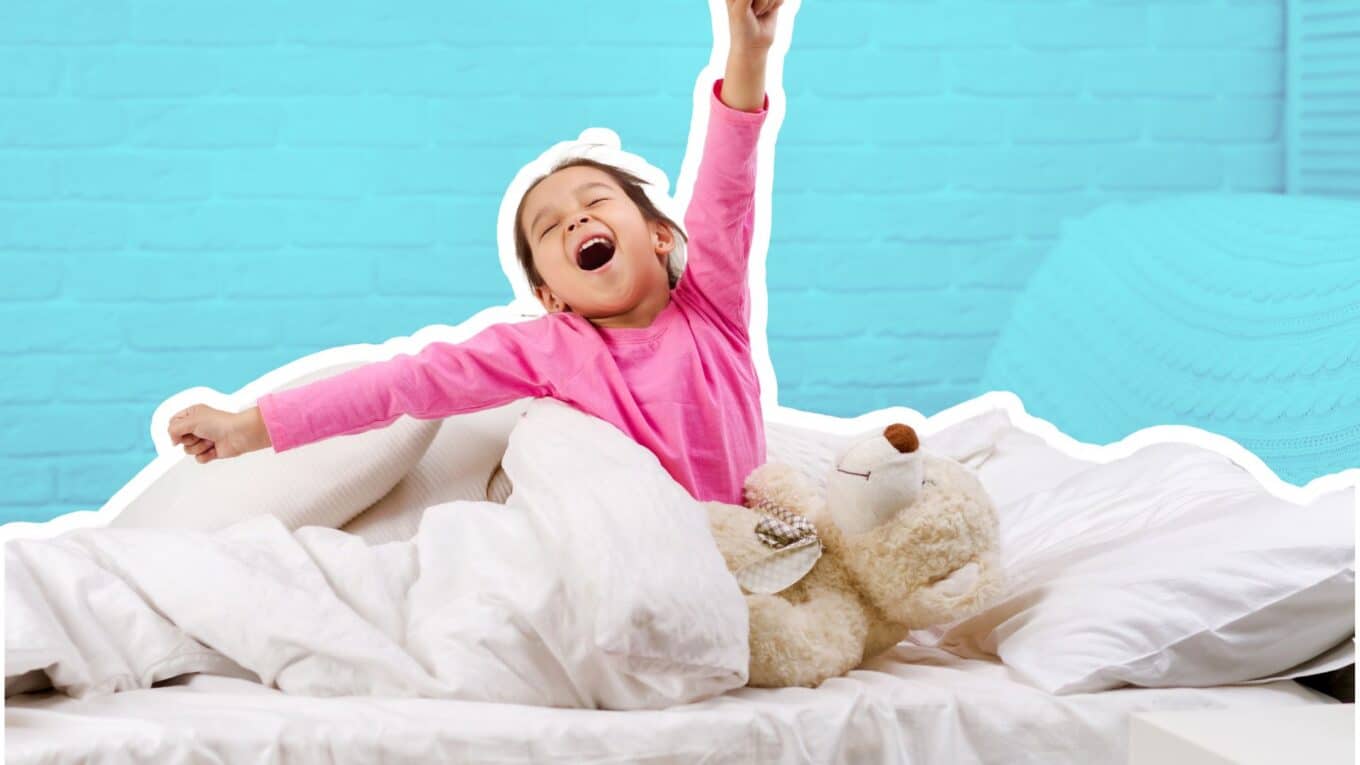We all know how hard it can be to stick to a daily routine. Whether you’re a busy parent or a working professional, finding time for important activities often feels impossible. But having a good routine is key to a happier, more productive life.
We’re here to help you build better habits. In this article, we’ll show you 27 daily routine activities that can work wonders for both kids and adults.
These simple yet effective ideas will help you structure your day, boost your productivity, and improve your overall well-being.
Get ready to transform your daily life with our practical tips and easy-to-implement activities.
Let’s explore how small changes can lead to big results!
Common Daily Routine Activities
1. Wake up And Stretch

Stretching first thing in the morning helps wake the body and mind. It increases blood flow to the muscles, which helps reduce stiffness and improves flexibility.
For kids, this sets a positive tone for the day, improving their physical readiness for activities like playing, learning, and engaging with others.
For adults, stretching helps alleviate any tension or discomfort from sleep, preparing the body for a day of work. Regular stretching improves overall mobility, preventing injury and boosting energy levels for both kids and adults.
2. Brush Teeth and Wash Face

Brushing teeth and washing the face are essential habits for maintaining personal hygiene.
For kids, brushing helps prevent cavities and instills the importance of oral care from a young age, ensuring they build healthy habits for the future. Washing the face removes any buildup of dirt or oils, keeping skin healthy and clear.
For adults, maintaining these routines is just as important for dental and skin health. Clean teeth reduce the risk of long-term oral health problems, while a clean face prevents skin irritation and improves appearance, which boosts self-confidence.
3. Eat Breakfast

Breakfast is often called the most important meal of the day, and for good reason.
For kids, eating a nutritious breakfast provides the energy they need to focus and perform well in school. It helps with memory, concentration, and overall cognitive function, setting them up for success in learning.
For adults, a healthy breakfast jump-starts the metabolism, regulates blood sugar levels, and ensures better daily decision-making. Skipping breakfast can lead to overeating later in the day and decreased focus, so it’s essential for maintaining good energy levels and a positive mood.
4. Plan the Day’s Activities

Planning the day gives structure and direction, reducing stress and increasing productivity.
For kids, this means they can prioritize homework, playtime, and chores, which teaches responsibility and time management.
For adults, daily planning helps to manage work tasks, personal commitments, and goals, ensuring that they stay on track. A well-planned day leads to fewer surprises and distractions, allowing both kids and adults to use their time effectively.
This habit is essential for reducing anxiety and fostering a sense of accomplishment.
5. Hydrate (Drink Water)

Hydration is key to staying healthy and energetic throughout the day.
For kids, drinking water helps them concentrate better during school, keeps their bodies properly fueled, and supports overall physical development.
For adults, hydration prevents fatigue, aids in digestion, and helps maintain clear thinking.
Dehydration can lead to headaches, sluggishness, and even mood swings, so ensuring both kids and adults drink enough water is vital for maintaining good physical and mental health.
Proper hydration also helps keep the skin healthy and supports bodily functions like regulating temperature and detoxification.
6. Exercise or Morning Physical Activity

Regular physical activity is essential for maintaining good health, whether it’s a brisk walk, yoga, or playing outside.
For kids, physical activity during the day helps develop motor skills, builds strength, and improves coordination. It also plays a crucial role in brain development, as exercise has been shown to enhance cognitive functions and learning.
For adults, exercise helps reduce stress, improves cardiovascular health, and increases energy levels. Incorporating exercise into the daily routine keeps both kids and adults fit, boosts mood through the release of endorphins, and helps regulate weight.
7. Take a Shower or Bath

Taking a shower or bath is essential for personal cleanliness and feeling refreshed.
For kids, this activity helps develop good hygiene habits from an early age, keeping their skin clean and healthy while reinforcing the importance of self-care.
For adults, a shower not only cleanses the body but also provides an invigorating start to the day, helping to clear the mind and energize the tasks ahead. It also helps in muscle relaxation and stress relief, especially after physical activity or a long day at work.
8. Clean up Personal Space (room/office Desk)

Organizing and cleaning up personal space, whether it’s a bedroom or office desk, helps create a clean and productive environment.
For kids, tidying up their room teaches responsibility and keeps their learning space organized, which can boost focus and creativity.
For adults, maintaining a clutter-free workspace promotes productivity, reduces distractions, and allows for better time management.
A clean and organized space also helps both kids and adults feel a sense of control and calm, reducing stress and making daily tasks more manageable.
9. Dinner with Family or Friends

Sharing dinner with family or friends is more than just a meal; it’s an opportunity to connect, bond, and reflect on the day.
For kids, it’s a time to learn social skills, express themselves, and feel included in family discussions. This routine fosters emotional security and strengthens family ties.
For adults, sitting down for a meal with loved ones provides a break from work or stress, promoting relaxation and mental well-being.
It’s also a time to enjoy good food, share experiences, and maintain meaningful relationships, which is crucial for emotional health.
Routine Activities for Kids
1. Get Dressed for School

Learning to dress themselves helps kids develop independence, responsibility, and decision-making skills.
Choosing their clothes for the day encourages them to plan ahead, and wearing appropriate clothing ensures they are comfortable and ready for the school environment.
This daily routine also teaches kids the importance of grooming and appearance, boosting their self-esteem and sense of identity.
2. Pack School Bag

Packing their school bag teaches kids to be organized and accountable for their schoolwork and belongings.
This activity helps improve memory and responsibility as they learn to ensure that they have all the necessary materials for the day, such as books, stationery, and homework.
It fosters independence as they develop a habit of preparing for their day ahead and taking ownership of their tasks.
3. Attend School or Virtual Classes

Attending school is essential for cognitive development, social interaction, and learning new skills. The school allows kids to develop their knowledge, improve critical thinking, and acquire skills that will serve them throughout life.
Beyond academics, the school teaches discipline, time management, and the ability to work in teams. It also helps kids build peer relationships, fostering social skills and emotional intelligence.
4. Participate in Recess or Playtime

Playtime is critical for kids’ physical, social, and emotional development. It allows them to release energy, practice motor skills, and engage in imaginative play.
Socially, it helps them develop communication skills, teamwork, and conflict resolution. Recess gives kids a much-needed break from structured learning, improving their focus and behavior when they return to the classroom.
5. Do School Homework or Assignments

Completing homework reinforces what kids have learned during the day and helps them practice problem-solving skills. It teaches responsibility, time management, and perseverance.
Homework encourages kids to think critically and independently, building the skills necessary for future academic and life challenges. It also keeps parents engaged in their child’s education by allowing them to track progress and offer support.
6. Engage in a Creative Activity (arts, Crafts)

Creative activities like drawing, painting, and crafting stimulate imagination and enhance fine motor skills. Engaging in artistic expression helps kids explore their creativity, improve concentration, and communicate their feelings in a non-verbal way.
These activities provide a relaxing and enjoyable outlet for kids, promoting emotional well-being while boosting their confidence in their creative abilities.
7. Playtime with Friends or Siblings

Social play is essential for developing communication, empathy, and teamwork. Playing with friends or siblings helps kids learn how to cooperate, negotiate, and resolve conflicts.
It also teaches them to share, take turns, and understand others’ perspectives, fostering emotional and social development. These interactions help build lasting friendships and strengthen sibling bonds.
8. Participate in a Sports Activity

Participating in sports teaches kids the value of teamwork, discipline, and perseverance. Physical activity promotes healthy growth and development, improves coordination, and strengthens muscles.
Playing sports also helps kids manage emotions as they learn to deal with winning and losing and enhances their ability to set and achieve goals. It instills a lifelong habit of fitness and well-being.
9. Family Storytime or Bedtime Reading

Storytime at night is a wonderful bonding activity that strengthens the parent-child relationship. It helps kids develop a love for reading, improves vocabulary, and enhances listening and comprehension skills.
Bedtime stories also create a sense of comfort and relaxation, making it easier for kids to unwind and transition to sleep. The routine of reading before bed sets the stage for a lifetime of learning and imagination.
Routine Activities for Working Professionals
1. Get Dressed for Work

Dressing appropriately for work helps professionals mentally prepare for the day ahead. Even for those working remotely, getting dressed creates a psychological shift from relaxation to productivity.
It boosts confidence and professionalism, which can positively influence interactions and performance throughout the day. Dressing well also sets the tone for how others perceive you, making it a vital part of personal branding.
2. Check and Respond to Emails

Staying on top of emails ensures clear and efficient communication with colleagues, clients, and superiors. Regularly checking and responding to emails helps professionals stay informed about ongoing projects, deadlines, and opportunities.
Managing emails also helps to avoid miscommunication and ensures timely responses, which is critical for maintaining professional relationships and ensuring smooth workflow.
3. Commute to Work or Start Remote Work

Whether commuting to the office or setting up a remote workspace, this transition signals the beginning of the workday. For professionals, the commute offers time to mentally prepare for the day or listen to podcasts or audiobooks for self-development.
Starting remote work with a structured setup ensures better focus and productivity. Creating boundaries between personal and work life leads to greater efficiency and reduced stress.
4. Attend Work Meetings or Calls

Regular meetings and calls help professionals stay aligned with their teams, discuss project progress, and resolve issues. Meetings provide an opportunity to collaborate, exchange ideas, and ensure that everyone is on the same page regarding goals and tasks.
Engaging in regular communication also strengthens team dynamics, improves problem-solving, and ensures smoother workflows.
5. Work on Daily Projects or Tasks

Tackling daily projects keeps professionals on track and moving toward their goals. It promotes discipline, focus, and time management. Working on tasks systematically ensures that deadlines are met and that projects are completed efficiently.
This habit also helps professionals build critical thinking skills as they solve problems and make decisions during their workday.
6. Take a Lunch Break

Taking a break for lunch is important for both mental and physical health. It allows professionals to recharge, prevent burnout, and improve productivity for the rest of the day.
A healthy lunch break can also provide an opportunity for social interaction with colleagues or a brief escape from work-related stress. Regular breaks improve focus and help maintain overall well-being.
7. Complete Work-Related Reports or Assignments

Completing reports and assignments is an essential part of any job, allowing professionals to communicate progress, achievements, and future goals.
Writing reports encourages attention to detail, critical thinking, and the ability to analyze and present data effectively. It also ensures accountability and transparency in the workplace, which is crucial for long-term success and career advancement.
8. Review Tomorrow’s Schedule

Reviewing the next day’s schedule helps professionals stay organized, reducing last-minute stress and improving time management. By planning ahead, they can prioritize tasks, set realistic goals, and ensure that nothing important is overlooked.
This preparation leads to a more productive and less chaotic workday, promoting a sense of control and readiness for the challenges ahead.
9. Unwind with a Book, Tv, or Hobby

Taking time to unwind after work is essential for mental and emotional well-being. Whether reading, watching TV, or engaging in a hobby, relaxation activities help professionals de-stress and recharge for the next day.
Hobbies provide a creative outlet and help individuals maintain a healthy work-life balance, which is crucial for long-term productivity and happiness. Relaxing in the evening promotes better sleep and overall well-being, reducing the risk of burnout.
Conclusion
As we wrap up our look at daily routines, remember that small steps can lead to big changes. The 27 activities we’ve shared are more than just tasks—they’re tools to help you shape a better day and, in turn, a better life.
For kids, these routines can build confidence and independence. For working professionals, they can boost focus and cut stress. But for everyone, they offer a chance to bring more order and purpose to each day.
Don’t feel pressured to try everything at once. Start small, be patient, and adjust as needed. Your perfect routine is out there, waiting for you to create it.
With time and practice, you’ll find the best mix for you and your family.




